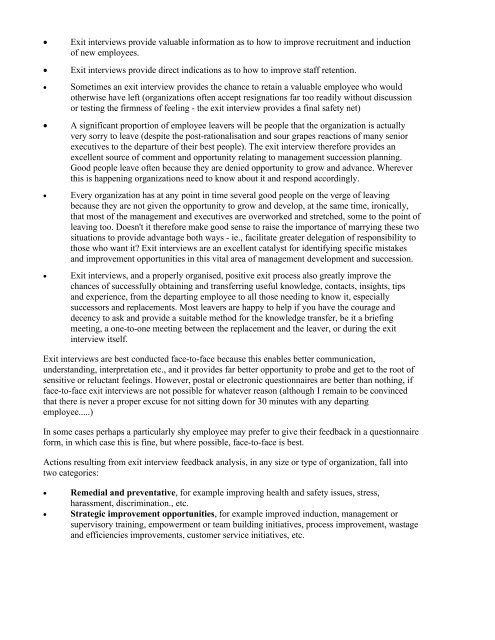Guide to conducting exit Interviews - Dean Amory
According to the NLH Knowledge Management Specialist Library, Exit Interviews are traditionally "conducted with employees leaving an organisation. The purpose of the interview is to provide feedback on why employees are leaving, what they liked or didn’t like about their employment and what areas of the organisation they feel need improvement. Exit interviews are one of the most widely used methods of gathering employee feedback, along with employee satisfaction surveys.
According to the NLH Knowledge Management Specialist Library, Exit Interviews are traditionally "conducted with employees leaving an organisation. The purpose of the interview is to provide feedback on why employees are leaving, what they liked or didn’t like about their employment and what areas of the organisation they feel need improvement. Exit interviews are one of the most widely used methods of gathering employee feedback, along with employee satisfaction surveys.
Create successful ePaper yourself
Turn your PDF publications into a flip-book with our unique Google optimized e-Paper software.
Exit interviews provide valuable information as <strong>to</strong> how <strong>to</strong> improve recruitment and induction<br />
of new employees.<br />
Exit interviews provide direct indications as <strong>to</strong> how <strong>to</strong> improve staff retention.<br />
Sometimes an <strong>exit</strong> interview provides the chance <strong>to</strong> retain a valuable employee who would<br />
otherwise have left (organizations often accept resignations far <strong>to</strong>o readily without discussion<br />
or testing the firmness of feeling - the <strong>exit</strong> interview provides a final safety net)<br />
A significant proportion of employee leavers will be people that the organization is actually<br />
very sorry <strong>to</strong> leave (despite the post-rationalisation and sour grapes reactions of many senior<br />
executives <strong>to</strong> the departure of their best people). The <strong>exit</strong> interview therefore provides an<br />
excellent source of comment and opportunity relating <strong>to</strong> management succession planning.<br />
Good people leave often because they are denied opportunity <strong>to</strong> grow and advance. Wherever<br />
this is happening organizations need <strong>to</strong> know about it and respond accordingly.<br />
Every organization has at any point in time several good people on the verge of leaving<br />
because they are not given the opportunity <strong>to</strong> grow and develop, at the same time, ironically,<br />
that most of the management and executives are overworked and stretched, some <strong>to</strong> the point of<br />
leaving <strong>to</strong>o. Doesn't it therefore make good sense <strong>to</strong> raise the importance of marrying these two<br />
situations <strong>to</strong> provide advantage both ways - ie., facilitate greater delegation of responsibility <strong>to</strong><br />
those who want it? Exit interviews are an excellent catalyst for identifying specific mistakes<br />
and improvement opportunities in this vital area of management development and succession.<br />
Exit interviews, and a properly organised, positive <strong>exit</strong> process also greatly improve the<br />
chances of successfully obtaining and transferring useful knowledge, contacts, insights, tips<br />
and experience, from the departing employee <strong>to</strong> all those needing <strong>to</strong> know it, especially<br />
successors and replacements. Most leavers are happy <strong>to</strong> help if you have the courage and<br />
decency <strong>to</strong> ask and provide a suitable method for the knowledge transfer, be it a briefing<br />
meeting, a one-<strong>to</strong>-one meeting between the replacement and the leaver, or during the <strong>exit</strong><br />
interview itself.<br />
Exit interviews are best conducted face-<strong>to</strong>-face because this enables better communication,<br />
understanding, interpretation etc., and it provides far better opportunity <strong>to</strong> probe and get <strong>to</strong> the root of<br />
sensitive or reluctant feelings. However, postal or electronic questionnaires are better than nothing, if<br />
face-<strong>to</strong>-face <strong>exit</strong> interviews are not possible for whatever reason (although I remain <strong>to</strong> be convinced<br />
that there is never a proper excuse for not sitting down for 30 minutes with any departing<br />
employee.....)<br />
In some cases perhaps a particularly shy employee may prefer <strong>to</strong> give their feedback in a questionnaire<br />
form, in which case this is fine, but where possible, face-<strong>to</strong>-face is best.<br />
Actions resulting from <strong>exit</strong> interview feedback analysis, in any size or type of organization, fall in<strong>to</strong><br />
two categories:<br />
Remedial and preventative, for example improving health and safety issues, stress,<br />
harassment, discrimination., etc.<br />
Strategic improvement opportunities, for example improved induction, management or<br />
supervisory training, empowerment or team building initiatives, process improvement, wastage<br />
and efficiencies improvements, cus<strong>to</strong>mer service initiatives, etc.


















